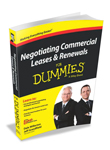By Jeff Grandfield and Dale Willerton – The Lease Coach

Negotiating a commercial lease for many independent retail storeowners is very challenging. Tenants may go through the leasing process once or twice in their entire lifetime – yet they have to negotiate against seasoned professionals who negotiate leases every day for a living. In addition, the agent or broker is largely commission-driven – he/she will earn a paycheck for each tenant signed.
Whether you are leasing a new location for the first time (or negotiating your lease renewal) for your independent retail business, these are some tips for tenants:
Negotiate to Win:
All too frequently, tenants enter into lease negotiations unprepared and do not even try winning the negotiations. If you are not even negotiating to win, you will not. With big commissions at stake, you can be sure the landlord’s agent, on the other hand, is negotiating fiercely to win. Tenants should remember that it is okay to negotiate assertively.
Be Prepared to Walk Away:
Try to set aside your emotions and make objective decisions. Whoever most needs to make a lease deal will give up the most concessions. A good retail operation in a poor location will become a poor business.
Ask the Right Questions:
Gathering information about what other tenants are paying for rent and what incentives they received will position you to get a better deal. Consider that your landlord and his agent know what every other tenant in the property is paying in rent, so you must do your homework too.
Brokers … Friend or Foe?
Real estate agents and brokers typically work for the landlord who is paying their commission. It is not normally the agent’s role to get the tenant the best deal – it is their job to get the landlord the highest rent, the biggest deposit, etc. The higher the rent you pay, the more commission the agent earns. If you are researching multiple properties, try to deal directly with the listing agent for each property, rather than letting one agent show you around or show you another agent’s listing. Your tenancy is more desirable to the listing agent if he can avoid commission splitting with other agents.
Never Accept the First Offer:
Even if the first offer seems reasonable, or you have no idea of what to negotiate for, never accept the leasing agent’s first offer. In the real estate industry, most things are negotiable and the landlord fully expects you to counter-offer (even repeatedly).
Ask for More Than You Want:
If you want three months free rent, then ask (negotiate) for five months. No one ever gets more than they ask for. Be prepared for the landlord to counter-offer and negotiate with you as well. Do not be afraid of hearing ‘no’ from the landlord – counter-offers are all part of the game.
Negotiate the Deposit:
Large deposits are not legally required in a real estate lease agreement. Deposits are negotiable and, more so than anything else, often serve to offset the real estate commissions the landlord will be paying out to the agent/broker. The Lease Coach is frequently successful in negotiating for the tenant’s deposit to be refunded when signing a lease renewal (and no deposit on new leases).
Measure Your Space:
Tenants frequently pay for phantom space. Most tenants are paying their rent per square foot, but often they are not receiving as much space as the lease agreement says.
Negotiate, Negotiate:
The leasing process is just that – a process, not an event. The more time you, the tenant, have to put the deal together and make counter-offers, the better the chance you have of getting what you really want. Too often, tenants mistakenly try to hammer out the deal in a two- or three-hour marathon session. It is more productive to negotiate in stages over time.
Educate Yourself and Get Help:
Unless you have money to throw away, it pays to educate yourself. Taking the time to read about the subject or listen in on a commercial leasing webinar will make a difference. And, don’t forget to have your lease documents professionally reviewed before you sign them. With hundreds of thousands of dollars in rent at stake, personal guarantees and other risks, you cannot afford to gamble. In leasing, independent retail tenants do not get what they deserve, they get what they negotiate.
